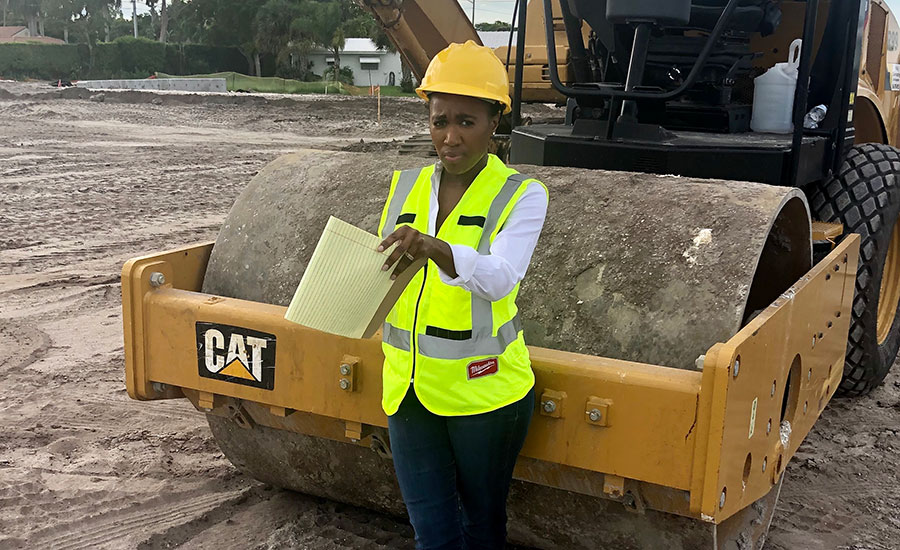In recent weeks, various large corporations have come forth, acknowledging the need for change and inclusion in the workplace. Yet, the construction industry has remained mute. As a black woman construction business owner who loves the industry, the silence of my peers speaks volumes.
The lack of conversation may lead some to believe the problem is bigger than we think.
My construction journey began when I was hired by Urban Metro Development, a top black-owned environmental contractor at the time. While there, I learned nearly every role I could—from receptionist to estimator, field supervisor, project manager and vice president.
Working at the firm was as an excellent learning experience. The management team was racially diverse, and more than 30% of field managers were women.
So when I launched my firm, LMS General Contractors, I didn’t understand the gravitas of being a double minority, a black woman, in a traditionally white male-dominated industry. Advancing through racism and sexism can be exhausting.
Racism and Micro-Aggressions
Sadly, I’ve been subjected to racism and micro-aggressions over the past 12 years. I’ve been called racial slurs by other contractor representatives. I’ve experienced being locked out of my own project site for “my safety” and had my equipment fuel lines cut in the middle of the night.
In the past 12 years, I’ve been called racial slurs by other contractor representatives. I’ve experienced being locked out of my own project site for “my safety” and I've had my equipment fuel lines cut in the middle of the night.
One of the most damning incidents was a Las Vegas casino telling me that a check could not be issued “because the casino ran out of paper.”
Despite the trials, I continue to believe in the construction industry.
A few years ago, I was the youngest black woman to acquire a California CSLB General Engineering (A) license. To enhance my business, I returned to school and earned a law degree with a business focus from Arizona State University.
Despite my educational and licensure achievements, it was not enough.
To get noticed by the larger contractors, I had to acquire certification. Due to the lack of diversity, black and minority companies are generally forced to rely on Affirmative Action, DBE, SBA, and local program certifications to become part of the team.
Often we aren’t gifted with relationships, mentorships, or resources in the industry to help foster our businesses. We don’t traditionally receive the invites to Christmas parties, fishing trips or golf tournaments.
With the industry raking in billions in revenue, it’s still uncommon to see black multi-general corporations created, sold to larger companies or have investors drive the company public. As the gap increases, minority businesses continue to socially and economically work from behind.
Companies owned and led by blacks, people of color, and women are absent from well-read lists of the top construction industry firms.
The implicit bias exhibited in the construction industry is evidenced through the lack of diversity in ownership, leadership, management and in the field. Diversity goals cannot be met with single hires or by naming a female employee of color as diversity and inclusion coordinator.
For firms sincere in their desire for change and inclusion, it starts at the top and must be witnessed at every level.
Black Companies = Black Jobs
Construction’s labor shortage remains critical. Inclusion allows for industry growth and adds to urban viability. More to the point, black companies create job opportunities for black people and people of color. For over a decade, I’ve hired and trained men and women with an 87% success rate. The more opportunities I obtain, the more people I can help get out of poverty, provide for families, and learn a trade through long term employment.
For construction firms and vendors to be authentic allies who support diversity, thoughtful approaches to accompany actionable steps are needed.
To see a change in construction culture, firms need to be accountable for diversity commitments at every level—hiring its employees, leaders, subcontractors and vendors. Top companies create the narrative and the trends that others follow. That said, they especially need to ask themselves the hard questions.
How many black contractors, minority contractors and women contractors were hired last year? In the past five years? Does the company go out of its way to hire only those who look like them or seem familiar? Do the company’s culture and team reflect inclusiveness?
Construction industry leaders have talked about the importance of diversity and inclusion. Now is the time to show it.
Change begins where our comfort level ends.
Jennifer Todd is owner and president of LMS General Contractors Inc., a Pompano Beach, Fla., certified woman- and minority-owned and operated general contractor and construction management firm. Established in 2013, LMS self-performs demolition, emergency cleanup and environmental remediation. She can be reached at jtodd@lmsgc.com



